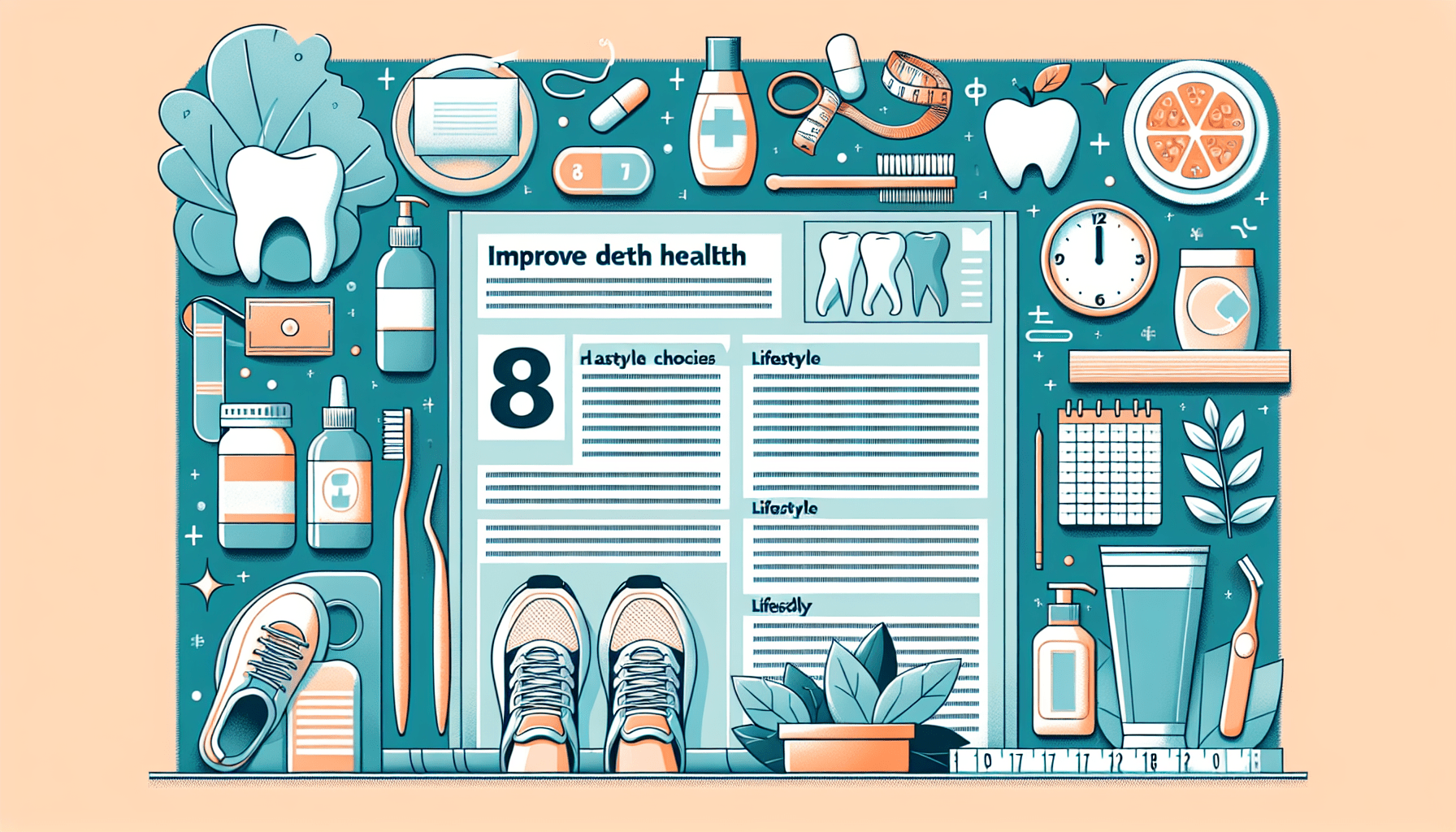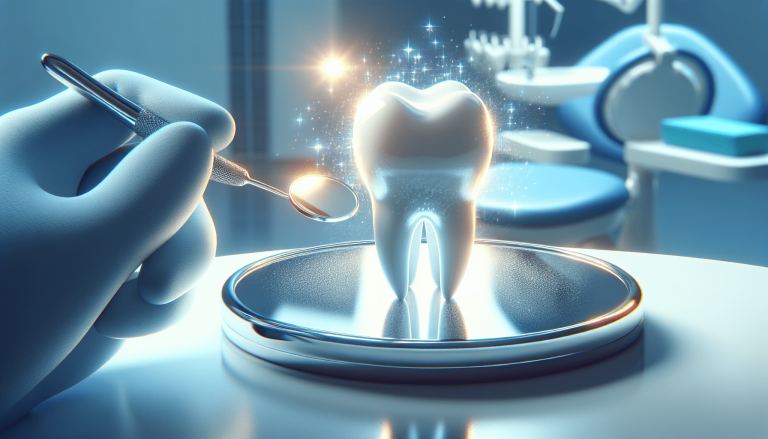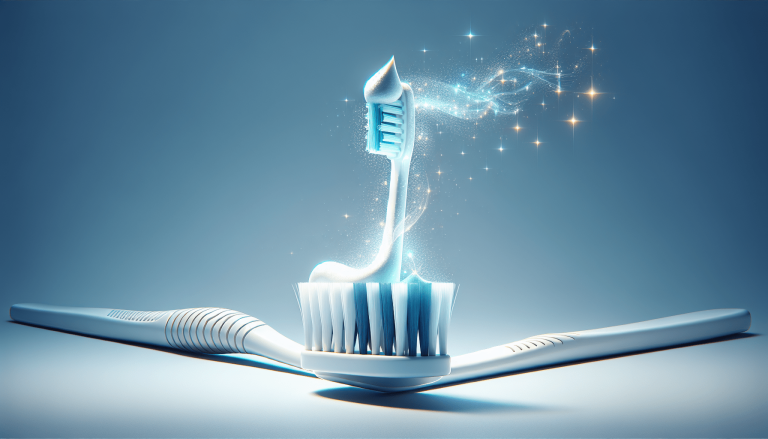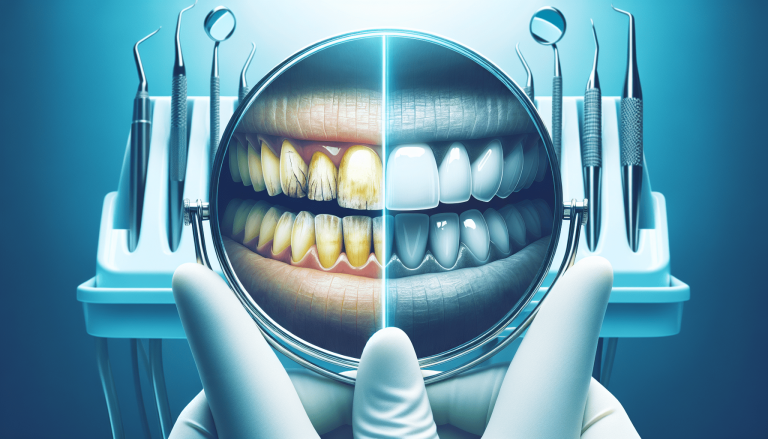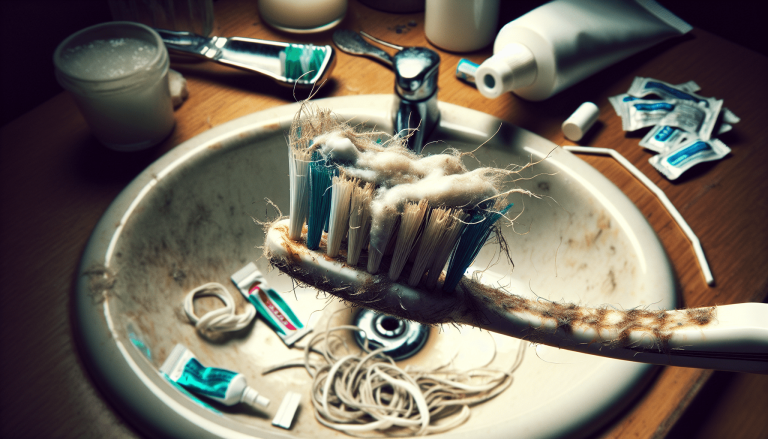How Can I Improve My Dental Health?
Taking care of your dental health is essential for maintaining a bright and healthy smile. From brushing and flossing regularly to scheduling regular check-ups with your dentist, there are several simple steps you can take to enhance your dental well-being. In this article, we will explore effective tips and techniques to improve your dental health and ensure that your teeth and gums stay in top-notch condition. By following these recommendations, you are on your way to achieving a healthier mouth and a happier you. So, let’s dive right in and discover how you can improve your dental health!
Brushing Techniques
Choosing the Right Toothbrush
When it comes to choosing the right toothbrush, you have a variety of options to consider. It’s best to opt for a toothbrush with soft bristles to avoid damaging your gums and tooth enamel. Additionally, make sure the size of the toothbrush head fits comfortably in your mouth, allowing you to reach all areas easily. Some toothbrushes also come with features like angled bristles or rubber grips for better control. Ultimately, the right toothbrush is one that you feel comfortable using and can maneuver easily while brushing.
Brushing Twice a Day
Brushing your teeth twice a day is essential for maintaining good oral hygiene. Make it a habit to brush your teeth once in the morning after breakfast and again before bed. By brushing in the morning, you remove the overnight buildup of bacteria and plaque. Brushing at night helps eliminate the accumulated debris from throughout the day. Remember to brush gently and in a circular motion to effectively remove plaque and food particles.
Using Proper Brushing Technique
Along with brushing twice a day, it’s crucial to use the proper technique to ensure a thorough clean. Hold your toothbrush at a 45-degree angle towards the gum line and make small, gentle circular motions. Be sure to cover all surfaces of your teeth, including the front, back, and chewing surfaces. Take your time and brush for at least two minutes to ensure you’re cleaning your mouth properly. Don’t forget to brush your tongue as well to remove bacteria and freshen your breath.
Flossing and Interdental Cleaning
Importance of Flossing
Flossing is a crucial step in your oral hygiene routine. It helps remove plaque and food particles from between your teeth and along the gum line, where a toothbrush cannot reach. Failing to floss regularly can lead to the buildup of plaque, which can cause gum disease and tooth decay. By incorporating flossing into your daily routine, you can greatly improve your dental health and prevent oral problems in the long run.
Proper Flossing Technique
To floss effectively, start with a piece of floss that’s around 18 inches long. Hold it tightly between your thumbs and index fingers, leaving a small, taut section for flossing. Gently slide the floss between your teeth, making a C-shape around each tooth and moving it up and down against the tooth surface. Be careful not to snap the floss or force it too hard against your gums, as this can cause irritation or bleeding. Repeat this process for each tooth, using a clean section of floss every time.
Using Interdental Brushes or Water Flossers
In addition to traditional flossing, interdental brushes or water flossers can be useful tools for interdental cleaning. Interdental brushes come in various sizes to fit the gaps between your teeth. You can gently insert the brush into the spaces and move it back and forth to remove plaque. Water flossers, on the other hand, use a stream of water to clean between your teeth and along the gum line. These tools can be particularly helpful for individuals with braces, dental bridges, or other dental appliances.

Choosing the Right Toothpaste and Mouthwash
Using Fluoride Toothpaste
Fluoride toothpaste is highly recommended by dental professionals for its cavity-fighting properties. Fluoride helps to strengthen tooth enamel and protect against tooth decay. When choosing a fluoride toothpaste, ensure it has the American Dental Association (ADA) seal of approval to guarantee its effectiveness and safety. Make sure to use a pea-sized amount of toothpaste and brush for the recommended two minutes to maximize its benefits.
Considering Specialty Toothpaste
Depending on your specific dental needs, you may want to consider specialty toothpaste. There are toothpaste variants available for sensitive teeth, tartar control, whitening, and more. If you experience tooth sensitivity, a toothpaste designed for sensitive teeth can help alleviate discomfort. If you’re concerned about tartar buildup, look for a toothpaste that specifically targets tartar control. It’s always a good idea to consult with your dentist to determine the most suitable toothpaste for your individual needs.
Selecting an Effective Mouthwash
Mouthwash is a valuable addition to your oral hygiene routine as it helps freshen your breath and kill bacteria that can cause bad breath or contribute to gum disease. When selecting a mouthwash, choose one that contains fluoride for added cavity protection. Additionally, look for a mouthwash that is alcohol-free to avoid drying out your mouth. It’s important to note that mouthwash should not replace regular brushing and flossing but rather be used as a supplemental tool for optimal oral health.
Maintaining a Healthy Diet
Limiting Sugary Foods and Beverages
Your diet plays a significant role in your dental health. Consuming excessive amounts of sugary foods and beverages can increase the risk of tooth decay and gum disease. When sugar comes into contact with the bacteria in your mouth, it creates an acidic environment that can erode tooth enamel. To protect your teeth, limit your intake of sugary snacks, sodas, and juices. Instead, opt for healthier snack options such as fruits, vegetables, and dairy products.
Eating Nutrient-Rich Foods
Eating a balanced diet with nutrient-rich foods is vital for overall health, including your dental health. Incorporate foods rich in calcium, vitamin D, and phosphorus, as these nutrients are crucial for strong teeth and bones. Dairy products, leafy greens, nuts, and fish are excellent sources of these essential nutrients. Additionally, foods high in fiber, such as apples and carrots, can stimulate saliva production, which helps to naturally clean your teeth and neutralize acid.
Drinking Plenty of Water
Water is not only essential for overall health but also for maintaining good dental hygiene. Drinking water throughout the day helps wash away food particles and bacteria, reducing the risk of plaque buildup and bad breath. Opt for fluoridated tap water when possible, as fluoride helps strengthen tooth enamel. If you prefer bottled water, check if it contains fluoride or consider using a fluoride mouth rinse for additional protection.
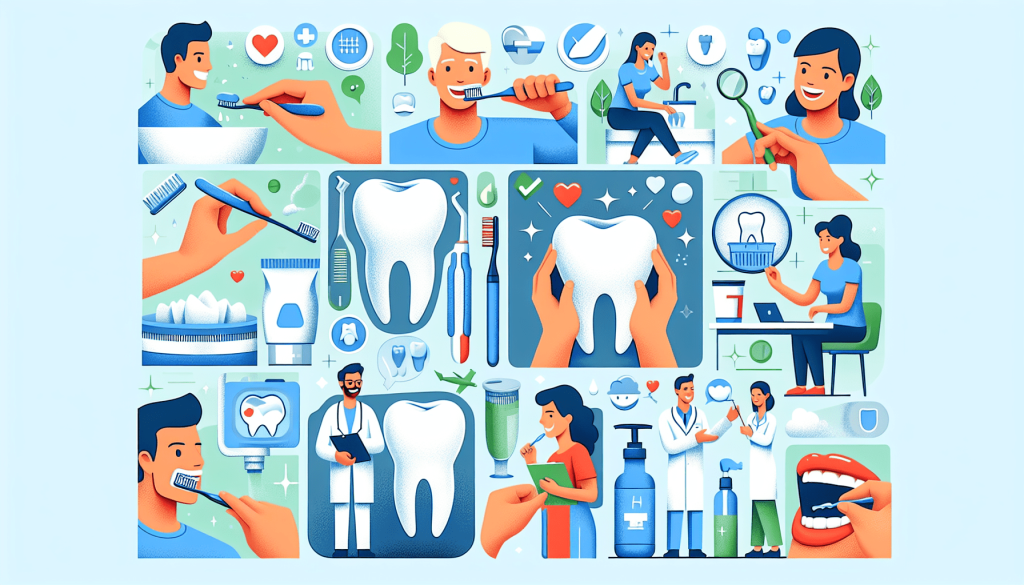
Avoiding Harmful Habits
Quitting Smoking
Smoking is not only harmful to your overall health but also has severe implications for your dental health. Smoking can cause stained teeth, bad breath, gum disease, and even oral cancer. Quitting smoking is one of the best things you can do for your oral health and overall well-being. Consult with your healthcare professional for support and resources to help you quit smoking successfully.
Limiting Alcohol Consumption
Excessive alcohol consumption can adversely affect your oral health. Alcohol can cause dry mouth, which increases the risk of tooth decay and gum disease. Additionally, heavy drinking can reduce your body’s ability to absorb essential nutrients required for healthy teeth and gums. If you choose to drink alcohol, do so in moderation and make sure to drink plenty of water to stay hydrated.
Avoiding Nail Biting and Teeth Grinding
Nail-biting and teeth grinding, also known as bruxism, can be harmful to your dental health. Nail-biting can chip or crack your teeth, while teeth grinding can lead to tooth sensitivity, jaw pain, and worn-down teeth. To break these habits, consider using stress reduction techniques, such as meditation or exercise, to manage anxiety or stress levels. If teeth grinding is a concern, your dentist may recommend a mouthguard to protect your teeth during sleep.
Regular Dental Check-ups
Scheduling Routine Dental Examinations
Regular dental check-ups are an essential part of maintaining good oral health. It is recommended that you visit your dentist at least twice a year for routine examinations and cleanings. During these visits, your dentist will assess your overall oral health, check for any signs of dental problems, and perform professional teeth cleaning to remove plaque and tartar buildup.
Importance of Professional Cleanings
Even with regular brushing and flossing, some areas of your mouth are challenging to clean thoroughly. Professional dental cleanings help remove tartar buildup, which cannot be eliminated by brushing alone. Additionally, dental hygienists can reach areas that may be missed during your daily oral hygiene routine. These cleanings not only improve your oral health but also have a positive impact on your overall well-being.
Identifying Dental Issues Early
Regular dental check-ups are essential for detecting dental issues early on before they become severe or more costly to treat. Regular examinations allow your dentist to identify and address any signs of tooth decay, gum disease, oral cancer, or other dental problems promptly. Early detection and treatment can help minimize the extent of dental interventions required and prevent further complications down the line.
Fluoride Treatment and Sealants
Beneficial Effects of Fluoride
Fluoride is a mineral that can help protect your teeth against cavities and tooth decay. In addition to using fluoride toothpaste, your dentist may recommend additional fluoride treatments during your dental visits. Fluoride treatments involve applying a fluoride gel or varnish to your teeth, which strengthens tooth enamel and helps prevent the formation of cavities. Children, in particular, can greatly benefit from fluoride treatments as their teeth are still developing.
Application of Dental Sealants
Dental sealants are thin, protective coatings that are applied to the chewing surfaces of your back teeth. These sealants act as a barrier, preventing food particles and bacteria from accumulating in the deep grooves and crevices of your molars. Sealants are commonly recommended for children and teenagers, but adults can also benefit from their protective properties. Talk to your dentist about whether dental sealants are appropriate for you or your child.
Protective Measures for Teeth
Both fluoride treatments and dental sealants serve as protective measures for your teeth. By using fluoride and applying sealants, you strengthen your teeth and create an additional barrier against tooth decay and cavities. These interventions are especially beneficial for individuals who are prone to dental issues or have deep grooves in their teeth that are difficult to clean. Talk to your dentist about incorporating fluoride treatments and sealants into your dental care routine.
Protective Gear for Sports
Wearing a Mouth guard
Engaging in sports activities poses a risk of dental injuries, such as broken teeth, knocked-out teeth, or jaw fractures. To protect your teeth during sports, wearing a mouth guard is essential. Mouth guards act as a cushion, absorbing the impact and reducing the risk of dental trauma. There are three main types of mouth guards: stock mouth guards, boil-and-bite mouth guards, and custom-fitted mouth guards. It’s important to choose the one that fits comfortably and provides adequate protection.
Considering Custom-Fitted Mouthguards
While stock and boil-and-bite mouth guards provide a basic level of protection, custom-fitted mouth guards offer a higher level of comfort and effectiveness. Custom-fitted mouth guards are created by your dentist using a mold of your teeth. They provide a secure fit, allowing for ease of breathing and speaking while providing optimal protection for your teeth and jaw during sports activities. Talk to your dentist about getting a custom-fitted mouth guard for optimal dental protection.
Preventing Dental Trauma
By wearing a mouth guard while participating in sports activities, you significantly reduce the risk of dental trauma. Dental injuries can be painful, expensive to treat, and may have long-term consequences. Investing in a suitable mouth guard is a proactive step towards protecting your teeth and preserving your smile. Remember to replace your mouth guard if it becomes worn or damaged to maintain its protective capabilities.
Proper Care for Dental Appliances
Cleaning Dentures and Removable Appliances
If you wear dentures or removable appliances, proper care is essential to maintain their cleanliness and longevity. Remove dentures or appliances after meals and brush them gently with a soft-bristle toothbrush and non-abrasive denture cleaner. Be sure to rinse them thoroughly to remove any residual cleaning product. When not in use, store them properly in a denture container with water or a denture solution recommended by your dentist. Regular dental check-ups are vital to ensure your appliances fit well and remain in good condition.
Taking Care of Orthodontic Devices
If you have orthodontic devices, such as braces or aligners, it’s important to follow your orthodontist’s instructions and care for them properly. Regularly brushing your teeth and appliances after meals and flossing using specialized orthodontic floss or interdental brushes is crucial to maintain oral hygiene. Avoid eating hard or sticky foods that can damage your appliances. Attend scheduled orthodontic appointments for adjustments and to address any concerns.
Replacing Worn-out Appliances
With time, dental appliances can become worn-out or lose their effectiveness. It’s important to replace them when necessary to maintain the desired outcomes and prevent potential oral health issues. Dentures that have become loose or cracked should be replaced or repaired by your dentist. Similarly, orthodontic appliances that are damaged or no longer functioning properly should be inspected by your orthodontist to determine if repairs or replacements are needed.
Maintaining Overall Health
Managing Stress Levels
Stress can significantly impact your oral health. High levels of stress may lead to teeth grinding, jaw clenching, or poor oral hygiene practices. To maintain your dental health, it’s crucial to manage your stress levels effectively. Incorporate stress reduction techniques into your daily routine, such as meditation, deep breathing exercises, or engaging in activities you enjoy. Remember that taking care of your mental well-being goes hand in hand with maintaining good dental hygiene.
Getting Regular Exercise
Regular exercise not only benefits your overall health but also contributes to your dental well-being. Engaging in physical activity helps increase blood circulation, promoting healthy gums and teeth. Exercise can also help reduce stress levels, which indirectly benefits your dental health. Aim for at least 150 minutes of moderate-intensity exercise or 75 minutes of vigorous-intensity exercise per week, as recommended by healthcare professionals.
Visiting a Healthcare Professional Regularly
Your oral health is closely linked to your overall health. Regular visits to healthcare professionals, including your dentist and primary care physician, are essential for maintaining optimal health. These professionals can identify any potential dental or medical issues early on, provide appropriate treatments, and offer guidance on maintaining a healthy lifestyle. Make it a priority to schedule and attend routine check-ups to ensure your overall health and well-being.
Incorporating these dental health practices into your daily routine can go a long way in improving and maintaining your oral health. Remember, prevention is key, and taking proactive steps towards a healthy smile will benefit you in the long run. So brush, floss, choose the right products, and prioritize regular dental check-ups to keep your teeth and gums in top shape. Your smile will thank you!
Additional Resources


